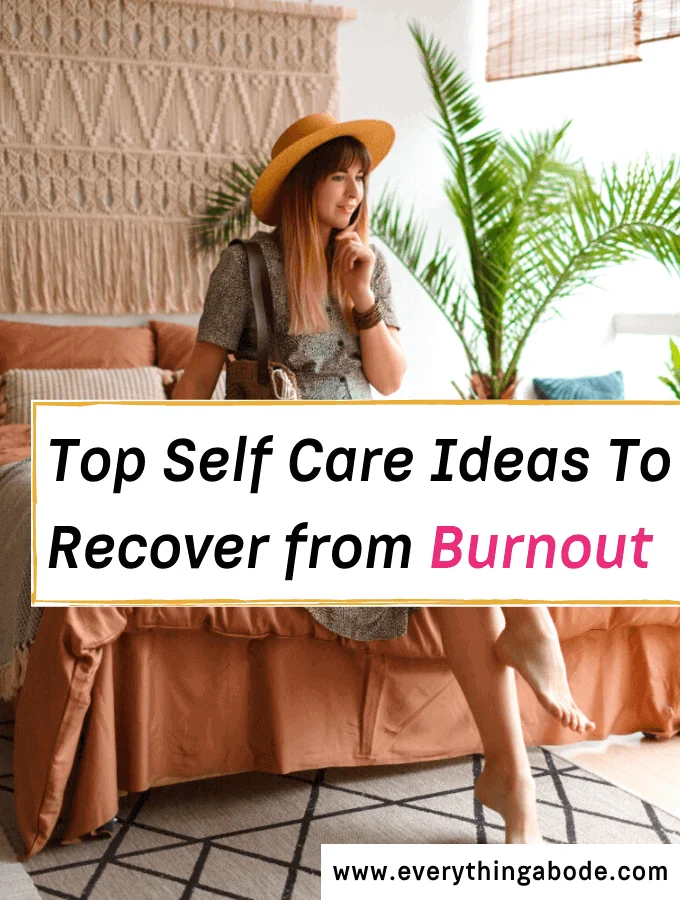How to recover from burnout. Today we’ll dive into the symptoms of burnout, what burnout syndrome is, and provide powerful self-care ideas to fully recover from burnout fast!

Are you suffering from burnout?
What is burnout?
Herbert Freudenberger, a psychologist in the 1970s coined the term burnout to describe a condition when severe stress causes physical, mental, and emotional exhaustion.
However, burnout is much more severe than normal fatigue. It makes it difficult to deal with stress, and manage day-to-day responsibilities.
Burnout can also come in many forms, and it can even strike the most resilient.
When this happens the brain shuts down when it becomes too exhausted to process information, and it has now been officially recognized as a medical condition called burnout syndrome.
In this article, we will discuss burnout syndrome, the negative effects of prolonged pressure an individual can have that may lead to burnout, followed by powerful self-care tips to fully recover.
Let’s get started!
Similar Topics:
- How to Set Intentions for the Day – 10 Easy Steps
- 10 Brilliant Ways to Master Self Discipline
- How to Stop Feeling Miserable
- How to Start a New Life!
How to recognize & recover from burnout

What triggers burnout?
Stress is a common problem if you feel overwhelmed.
This imbalance could also be caused by the pressure that we feel every single day.
To properly treat burnout, however, it is crucial to determine what is triggering it.
In order to rediscover meaning and joy in your career and life, it’s vital that you have a plan and tackle the root.
The first step to understanding your burnout, Dr. Maslach, and her colleagues did a great job describing three distinct forms of burnout in their paper The Future of Burnout, which details the following:
Interpersonal burnout:
Interpersonal burnout is seen as the byproduct of stressful working relationships, environments, market changes, or interpersonal conflicts such as with a supervisor or a co-worker.
Dr. Maslach and her colleagues also point out that even market changes can trigger burnout just as much as everything else that is interpersonally listed above.
Individual burnout:
Individual burnout is considered the byproduct of factors linked to overly negative self-talk.
Negative self-talk can cause stress and havoc on the nervous system which can lead to burnout sensations.
Moreover, if you are negatively blaming outside circumstances, individual burnout could be the culprit that’s causing you the stress you are feeling without you even being aware of it.
Organizational burnout:
This is seen as a difference between the employee and the job.
In short, there’s a workplace mismatch that’s going on, such as one could be in the wrong industry or wrong position within their chosen career field.
Plus, we all know we can’t force nature, therefore organizational burnout could be the result if you are experiencing burnout a lot.
Nonetheless, these three factors can lead to unhealthy habits such as overworking to sleeping less, which can cause our immune systems to suffer greatly.
Moreover, this imbalance must be treated quickly because you don’t want your burnout to turn into a more serious situation such as depression.
Recognizable Symptoms of Burnout.
A person who is suffering from burnout may feel extremely drained, have distorted and often cynical perceptions of themselves and others and may also recognize a few additional symptoms if they fall into one of the categories of having work/stress-related burnout such as:
- Feeling overly fatigued
- Excessive negative self-talk
- Insomnia
- Having minor or immense aches and pains throughout the body including frequent headaches
- Feelings of listlessness like they can’t go on.
People with burnout may also want to isolate or escape.
Isolation. When people feel overwhelmed, they may stop confiding in their friends, family, and coworkers.
Escape fantasies. People with burnout might fantasize about leaving their job or taking a solo vacation. Extreme cases may resort to food, drugs, and alcohol to ease their emotional pain.
Physical burnout symptoms:
Chronic stress can lead to physical symptoms such as intense headaches, intestinal problems, fatigue, body aches, and loss of appetite or overeating which are all due to stress.
Emotional burnout symptoms:
Feeling ‘burnt out’ can also make people feel emotional symptoms such as exhaustion, incapable to function, tiredness, self-critical, depression, listlessness, anger, and sadness.
The 12 stages of burnout.
Going a little bit further, burnout isn’t like a cold or flu and it doesn’t hit all at once.
In fact, Psychologists Herbert Freudenberger and Gail North, have described the 12 phases of the StressTrusted Source syndrome that describes how burnout can take shape:
Excessive drive/ambition. This first phase is typical for people starting a new job or taking on a challenging task with too much ambition and drive.
Pushing yourself to work harder. Suppose you push yourself to do even more. Ambition drives you to work and working harder can lead to burnout.
You are neglecting your needs. You start to neglect self-care such as exercise, sleep, and healthy eating habits.
Conflict displacement. You blame your boss, job demands, and colleagues instead of admitting that you are pushing yourself too hard.
There is no time for other non-work-related activities. You start to withdraw from your family and friends. You find it challenging to accept invitations to social events, movies, or dinner dates.
Denial. You become impatient with others. Instead of accepting responsibility for your actions, you blame others and see them as lazy, incompetent, and overbearing.
Withdrawal. You withdraw from your family and friends. You find it challenging to accept invitations to social events, movies, or dinner dates.
Behavior changes. People on the path to burnout might become more aggressive and snap at their loved ones without reason.
Depersonalization. You are feeling disconnected from your life and your control over it.
An inner feeling of emptiness and anxiety. You are feeling empty or anxious. To cope with these feelings, you may resort to overeating or substance abuse.
Depression. You feel lost and hopeless, and life loses meaning.
Mental and physical collapse. When the last phase happens, it can impact your coping ability and capacity. You may need medical attention or mental health care.
Who gets burnout?
Burnout is a familiar occurrence for anyone who is constantly exposed to high-stress levels.
This health condition, in particular, is especially common in professionals such as doctors, nurses, and first responders.
Additionally, people who care for children also experience burnout. In fact, recent research has shown that mothers and fathers experience burnout.
Moreover, the risk of burnout can be increased by traits such as being a perfectionist, control-oriented, or having a Type A personality.
As you can see, if you have any of these recognizable symptoms, there is a way for you to turn it all around.
Thankfully there are a few powerful self-care practices that each person can do in order to feel like themselves again.
Here are powerful self-care ideas to treat burnout and ultimately recover from it!
9 Powerful Self-Care Ideas to recover from burnout

1. Prioritize sleep.
Not only is sleep important for your overall health, but it can also help you to combat burnout.
Since some individuals take pride in working around the clock they often get burned out because of it.
However, overworking is not the only reason people feel burnt out, and being aware of your sleep hygiene is a great preventive measure for burnout.
Here are five tactics to improve your sleep:
- prioritize your sleep just as much as your busiest tasks to reduce long-term stress.
- Focus on progress and not perfection
- Go to bed and get up at the same time
- Avoid stimulants that reduce sleep quality, such as alcohol and caffeine, 4-6 hours before bedtime.
- Turn off your digital devices for up to 2 hours before you go to bed so that you don’t disrupt the quality of your deep sleeping.
2. Avoid worrying.
A great way to get rid of burnout is to stop worrying about the future and live in the moment.
If you want to feel happy after a long work week, for example, don’t worry about the things you cannot control.
Worrying leads to stress and we all know that stress can be a sign of burnout. However, other health issues like heart disease or depression can stem from stress.
Moreover, worrying make it more difficult to get the restful sleep you need every night to allow your body’s natural healing process, known as REM (rapid eyes movement), to kick in.
3. Stay nourished & limit caffeine in the afternoon.
Is your body burning at both ends of the candle?
A great way to get rid of burnout is to eat well and avoid caffeine in the evenings.
Good nutrition and food are essential for our bodies when we’re tired.
High levels of processed carbohydrates, for example, can lead to blood sugar levels rising before plummeting back into an energy slump after the high wears off.
Therefore, it is better to choose nutritious foods than sugary and carb-laden foods. This will reduce stress.
It is also a good idea to pay more attention when you consume caffeine throughout the day.
You may feel more awake and alert throughout the day if you eliminate those caffeine crashes.
SEE ALSO: Why you should consider adaptogens over coffee if you are stressed out!
4. Manage negative self-talk.
It can be hard to manage the overwhelming negativity that comes with burnout.
Moreover, it’s even harder when it starts affecting our moods and relationships.
So if you are suffering from negative self-talk, your burnout might be a pivotal time to change that!
Sometimes getting burned out can help us take a step back from what might seem like unending problems.
Moreover, if you can stop to look at your circumstances objectively there may just be something good or interesting happening…
For example, a shift in your mindset could help decrease feelings of hopelessness, increase your self-worth, and could ultimately lead you closer to achieving your goals.
5. Learn to cope with your fight & flight response.
During a burnout phase, our nervous system becomes all out of order.
And during these moments our fight or flight response will get stress-activated.
Both adrenaline and cortisol are the two hormones that circulate the bloodstream during a burnout phase.
This means that depending on your state your responses to stress during your burnout phase may become more volatile and more reactive than normal.
As the fight or flight reflex is initiated, our bodies believe that we are actually getting ready for a battle and according to studies, only physical exercise and deep respiration (deep breathing) can help to calm the nervous system.
Additionally, inactivity will only make things worse because the chemical surges coursing through the body will be left unchecked without any form of release!
That’s why, in these particular times, if you continue breathing deeply and pair it with physical activity, will help calm you down and better manage stressful times.
6. Know what you can handle.
One of the best ways to take better care of yourself so you can fully recover from burnout is using the word “no!”.
No! That’s the word you need to start saying during your burnout phase because every “yes” that you say will only add to your workload and stress.
And once again you will be eliminating the time you need for yourself and for your basic needs.
So the next time you are asked if can take over someone else’s duty at work or handle that extra task? Think before speaking and know what you can handle.
SEE ALSO: 12 Things You Should Never Apologize For
7. Carve out time alone.
Another form of self-care that will help you cure burnout is to carve out “me time” every day where it’s just solely for you.
It can be anything from taking a walk around the block to resting your eyes for 15 minutes.
Remember, during a burnout phase, your stress levels are already going to be ultra-high, so if you can fit all of your other obligations around this time slot and make these moments of me-time uninterrupted, your symptoms should greatly decrease.
8. Do something different!
When it comes to recovering from burnout, It is important to recognize when you have worked too hard or lost interest in your work.
So to answer this try “taking a break” from your job and do something different.
Whether it is volunteering or taking up an indoor hobby that has always interested you, it’s never too late to try something new.
On another note, It’s easy to get bored if you are passionate about your job and work full-time every week. If this happens, take some time out from work to recharge yourself.
A short vacation can make you feel better, especially since focusing on the things that you love is beneficial.
Rediscover what gives you the greatest sense of joy and focus on that. It is vital that you make time for the things that you enjoy so you can alleviate stress and burnout.
9. Answer these important questions.
When it comes to feeling burnt-out and trying to recover from it, sometimes self-care can only go so far in the hopes of feeling better.
So if you tried all of these suggested self-care ideas and are still experiencing an overwhelming sense of burnout?
These questions will help you to make a permanent and lasting change that will allow you to feel relief:
-
- Has your sleeping pattern changed?
- Are you pessimistic while you’re at work and home?
- Are you dragging yourself to work and do you find it difficult to start your job motivated?
- Do you need extra energy in order to be consistently efficient every day?
- Are you lacking the energy to be more productive even on weekends?
- Do you consistently use alcohol and food as a crutch to feel better?
First off, it’s not uncommon to feel burnt out in today’s society, however, if you answered “yes,” to two or more of these questions, then it might be time for a check-up with your doctor!
These symptoms can also signal deeper problems including severe anxiety and depression.
However, don’t fret as burnout is normal; all that needs to be done is putting yourself first by taking action towards solving the problem at hand and seeking professional help when needed.
This can make your life easier than you ever imagined.
How to recover from burnout final thoughts.
There is hope for anyone who has ever felt defeated.
And you can turn things around, but it does take time.
Since everyone is unique, take each day as it comes and practice patience throughout your journey.
You’ll be your best self if you include a few of these how to recover from burnout self-care tips, to help you along the way!
If you are looking for more proven self-care ideas to help you feel better? Make sure to check out these 34 more ways to practice self-care on a daily basis!
Thanks for reading!
See also:
Check out, How to Start a Self Care Routine Easily, next!
You may also like:
- How to Set Intentions for the Day – 10 Easy Steps
- 10 Brilliant Ways to Master Self Discipline
- How to Stop Being Miserable & Start Feeling Happy
- 12 Things You Should Probably Do Every Single Day
How to recover from burnout
Author: Everything Abode
Welcome to Everything Abode, your daily inspiration for every activity at home!
Our goal is to inspire you to live an elegant and chic lifestyle from the comfort of your home.
We’ll help you express yourself through authentic style, aesthetic beauty, and stylish home decor.
How to Stay Attractive: 8 Habits To Enhance Your Beauty
How to Do a 30 Day Mental Health Challenge
33 Self Discovery Journal Prompts (A Challenge Worth Trying)
Personal Growth and Development: 16 Ways To Grow!
The Science Behind Your Vibes - 5 Ways To Raise Your Vibration
34 Daily Self-Care Ideas to Take Better Care of Yourself
Subscribe to Get the Tools That Make My Blog Successful!

When you join my newsletter, I'm going to send you insider advice and tools that I use to grow my blog! I only save the BEST for my email list so don't wait!

